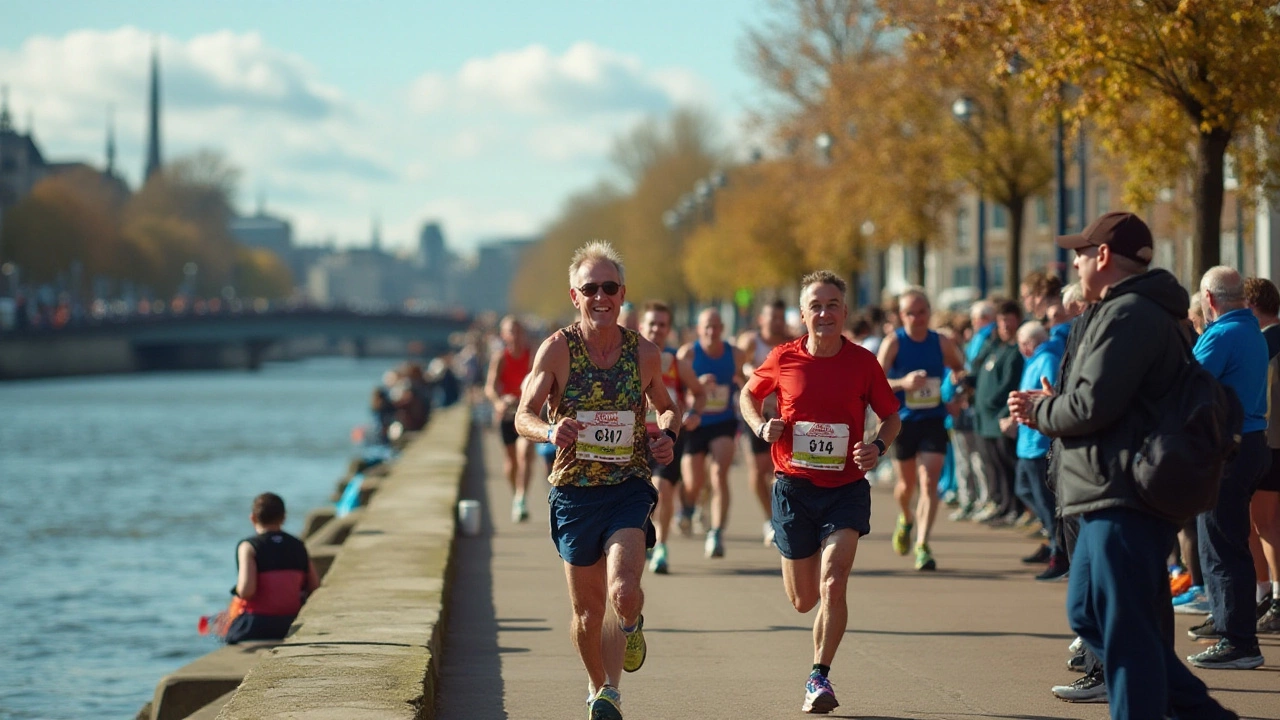Is 4.5 Hours a Good Marathon Time? Insights and Tips for Runners

Diving into marathon running is both an exhilarating and nerve-wracking journey. For many, just finishing the event is a triumph, but there's always talk about what makes a good marathon time. Completing a marathon in 4.5 hours may sound ambitious or achievable depending on whom you ask, but deciphering whether it's a good time requires a closer look at various components.
For starters, a 4.5-hour marathon translates to running over 26.2 miles at a pace of roughly 10 minutes and 18 seconds per mile. Whether or not this is a good time largely depends on an individual runner's goals, experience, and specific circumstances surrounding their race day. Many runners set personal goals simply to finish or to outdo their previous best. Equipped with the right strategies and training techniques, aiming for or surpassing a 4.5-hour mark can become a realistic and gratifying target for many enthusiasts.
- What Makes a Good Marathon Time?
- Factors Influencing Marathon Finish Time
- Importance of Consistent Training
- Pacing Strategies for Marathon Success
- Tips for First-Time Marathon Runners
What Makes a Good Marathon Time?
Determining what constitutes a good marathon time can be subjective, often rooted in personal goals and individual experiences. For many amateur runners, a sub-four-hour marathon may represent the pinnacle of personal achievement. However, a marathon time of 4.5 hours is typically seen as a respectable benchmark, especially for those new to the long-distance running scene. At this pace, one seeks consistency more than speed, making it a suitable goal for many.
It's crucial to acknowledge that achieving a good marathon time involves a blend of factors. Age and gender are critical determinants since average marathon times vary considerably across demographics. For instance, according to historical data from large races like the Boston Marathon, the average finish time for men is around 4 hours and 5 minutes, while for women, it hovers closer to 4 hours and 35 minutes. These insights provide useful context for setting realistic goals.
"A good marathon time is more personal than it is universal. Everyone's journey and finish line look different," says Kate Ward, a renowned marathon coach.
A crucial aspect of this discussion is setting personalized goals. An individual finishing their first marathon may deem completion itself as a triumph, regardless of clock time. In contrast, seasoned marathoners might pursue a time-based personal record, pushing their boundaries beyond comfort zones. When evaluating good times, one also considers the course's uniqueness, as terrain and weather significantly impact performance. Hilly routes or hot and humid conditions naturally result in longer times. Thus, a good time in Chicago's flat course may differ from New York's hilly challenge.
It's also helpful to recognize that running a marathon is as much about mental perseverance as it is about physical endurance. Setting a time goal can act as motivation, yet resilience often trumps watch settings when hitting mile twenty. Many runners grapple with the infamous 'wall,' a point where energy wanes and each step requires monumental effort. The ability to push through coupled with a strategic race day hydration and nutrition plan will dramatically influence finishing times. In essence, a good marathon time considers, respects, and adapts to these multifaceted elements.
Factors Influencing Marathon Finish Time
Running a marathon is no small feat, and numerous factors can significantly impact your finish time, making each race a uniquely challenging experience. One of the most significant influences is the runner's baseline fitness level. Individuals who consistently engage in cardiovascular and strength-training exercises tend to have a solid foundation for tackling long-distance races like marathons. Regular training helps in boosting endurance, improving muscle performance, and enhancing cardiovascular and respiratory efficiency, all vital components when aiming for a specific marathon time. Runners need to focus on building their endurance over months before the event, incorporating various types of runs such as speed work, long runs, and recovery runs to prepare adequately.
Another crucial factor is the race day conditions. Weather can unpredictably change the game, often alluding even to seasoned runners. A cool, overcast day with mild humidity can create ideal circumstances for fast times, whereas heat, wind, or rain can derail even the best-laid plans. Wind resistance or dehydration can sap energy reserves quickly, and underestimating these influences can result in prolonged struggle on the course. Moreover, the terrain of the marathon also plays a decisive role. A course peppered with hills can slow down many participants, making it harder to maintain a consistent pace compared to flatter landscapes. Studying the course map beforehand helps in understanding where potential challenges lie and planning pacing strategies accordingly.
Nutrition and hydration strategies employed both in the lead-up to and during the race contribute immensely to the perceived difficulty of the marathon. Glycogen stores, the body's primary source of energy for endurance events, must be adequately stocked through strategic carbohydrate loading in the days leading up to the race. During the marathon, balancing energy intake with fluids and electrolytes can stave off fatigue and muscle cramps, common adversaries for those pursuing a 4.5-hour finish or better. In this context, paying attention to personal nutrition and hydration needs becomes imperative, as generic advice might not suit everyone. As sports nutritionist Nancy Clark famously said,
"Your diet can make or break your marathon experience. Getting it right leads to success, while poor nutrition choices can lead to apparent insurmountable struggles."
Mental fortitude and race experience are often underestimated but play pivotal roles in determining marathon outcomes. A runner's mental state can have a profound influence, often boosting or undermining physical capability. Mental strategies like visualization, setting incremental goals, and maintaining a positive outlook can help navigate the inevitable tough phases of a marathon. Experienced runners have an edge as they are better at pacing themselves, recognizing signs of fatigue, and making real-time adjustments to their race plan. Additionally, knowing energy gels or hydration stations' precise locations from earlier participations can alleviate worries, allowing athletes to focus more intently on their run.
Lastly, equipment and gear choices cannot be overlooked, impacting everything from comfort to safety. The right pair of shoes, customized to fit one's specific running style and body mechanics, can prevent injuries and sustain efficiency over the extended mileage. Similarly, weather-appropriate clothing helps manage body temperature, reducing the likelihood of overheating or exposure-related problems. Many runners also leverage technology, such as GPS watches, to keep track of metrics like pace, cadence, and timing, adjusting their efforts as needed to meet personal goals. Understanding and optimizing these variables allows for better preparation and execution of marathon strategies, especially when the coveted finish line — and a potential personal best marathon time — is on the horizon.

Importance of Consistent Training
Training for a marathon isn't just about running long distances whenever you feel like it; it's about building a strong foundation through consistent training. The importance of this cannot be overstated, as it lays the groundwork that affects everything from performance to injury prevention. Contrary to the notion of cramming miles last minute, consistency in training helps acclimatize your body gradually, which is less stressful on both mind and body. This approach solidifies muscle memory, heart rate adaptability, and establishes an efficient metabolic base crucial for enduring the grueling race day. Developing a structured training plan ensures you are progressively challenging your system while allowing time for recovery, thereby reducing the likelihood of injuries.
Most marathon training plans stretch over several months, promoting incremental increases in mileage that allow your body to adapt without straining. An effective plan often includes a mix of long runs, short recovery runs, speed work, and strength training, each serving a specific purpose. The long runs simulate race conditions, helping you build stamina and mental resilience. Shorter runs support recovery and maintain leg turnover speed, while speed work, though tough, increases your running economy and helps you run more swiftly with less effort. Incorporating strength training into your regime enhances muscle strength and joint stability, both critical factors in improving race day performance and longevity in the sport.
Consistent training also plays a role in developing mental endurance, arguably as essential as physical endurance during a marathon. Establishing a routine that includes regular training teaches the mind discipline and enhances mental toughness. This psychological training is pivotal when you're hitting the proverbial "wall" during a marathon, turning your mindset from one that is prone to quitting, to a resilient one that can push through discomfort and fatigue. Moreover, the routine offers a mental blueprint for race day, reducing anxiety because you know what to expect from both your body and mind. This synergy between mental and physical training makes all the difference during the crucial moments of the marathon when determination is tested.
"Victory is in having done your best. If you've done your best, you've won." - Bill Bowerman, legendary coach and co-founder of Nike, aptly captures the essence of consistent training and setting personal benchmarks.
Some data even suggests that runners who train consistently tend to finish marathons significantly faster than those with erratic schedules. The beauty of marathon training is that it is adaptive to your fitness level. For those wondering if a 4.5-hour marathon time is a good benchmark, consistent training can be your ally. Whether you're aiming to maintain pace in every mile or improve personal records, sticking to your regimen ensures you are working towards your goals effectively. Developing a habit of steady training inculcates discipline and allows your running muscles, joints, and heart to undergo testing and recovery in cycles, optimizing performance on race day.
In essence, consistent training transforms running from a mere task into a rewarding journey. It's more than clocking miles; it's about the evolution of a runner, both internally and externally. Regardless of where you start, seeing the progress week after week offers its own reward, making the potential target of a marathon time of four and a half hours not just a possibility but a reflection of dedication and structured effort. So, lace up those shoes, stick to your plan, and look forward to the pride that comes with finishing strong.
Pacing Strategies for Marathon Success
Achieving marathon success, especially if you're aiming for a specific time like 4.5 hours, relies heavily on the art of pacing. Understanding and implementing a solid pacing strategy can not only keep you on track to meet your goals but also ensure you conserve energy and maintain momentum throughout the race. A consistent pace helps maintain your energy levels, preventing you from starting off too fast and risking burnout before the finish line. Instead, it encourages maintaining a steady rhythm that aligns with your training and personal capabilities.
To create an effective pacing strategy, runners often break the marathon into segments, focusing on maintaining a target pace for each section. Many successful marathoners employ the 'negative split' technique, where the second half of the race is run faster than the first. This approach makes sense: starting conservatively allows your body to warm up, adjusting to race conditions without emptying your tank too quickly. The key is to know your sustainable pace through training runs and not be influenced solely by adrenaline and crowd excitement.
"The key to effective pacing lies in disciplined adherence to a balanced approach," advises renowned coach and marathoner Hal Higdon. "It's about listening to your body while sticking to a predefined plan."For running enthusiasts, leveraging tools like a GPS watch can be invaluable. These devices help track splits in real time, offering immediate feedback and adjustments if you find yourself off pace. Incorporating this technology into training allows runners to fine-tune their pacing over various distances, ultimately providing more control on race day.
Pacing for a marathon isn't just about time—it involves mental preparation as well. Building mental resilience sets successful marathon runners apart, ensuring they remain focused and positive, even as they contend with physical fatigue. Mental strategies such as visualization, breaking the race into smaller, manageable parts, and positive self-talk can greatly assist in maintaining the right pace. Consider incorporating these techniques into practice sessions, simulating race day scenarios to bolster your mental fortitude.
For those aiming to improve their marathon time, paying attention to effort levels rather than constantly checking the clock can prove advantageous. The concept of running by 'effort' ties back to knowing what levels your body can sustain based on training and experience. Professional runners often base their pacing strategy on perceived effort, noting that external conditions on race day, such as wind and temperature, can influence actual versus perceived exertion. Stay flexible and adjust your pace as needed while prioritizing how your body feels during the race.

Tips for First-Time Marathon Runners
Embarking on your first marathon journey is undeniably an exciting venture that demands dedication, patience, and a bit of strategy. As a first-time marathoner, you are stepping into a world filled with the roar of cheering crowds, scenic routes, and personal triumphs. To set yourself up for success, starting with the right preparations is crucial. One of the initial pieces of advice is to set realistic expectations. Instead of targeting a specific time, focus on the experience of running the full distance. This mindset not only alleviates unnecessary pressure but also allows you to savor every moment of your first marathon without the burden of comparisons or time constraints.
Consistency is the bedrock of effective marathon training. Craft a plan that progressively builds your running mileage over weeks and months. Consider incorporating both short and long-distance runs to build endurance. Integrating rest days is equally critical in your schedule to prevent burnout and injuries. Cross-training, like swimming or cycling, can supplement your running sessions, contributing to overall fitness while preventing repetitive stress on muscles. Good training isn't about pushing through pain but listening to your body and adapting when necessary. One of the most significant mistakes newcomers make is ignoring signs of discomfort or minor injuries. Address issues promptly to avoid long-term setbacks.
An exemplary piece of advice comes from a well-known marathoner, Tim Noakes, who once said,
"Running is a mental sport, and we're all insane."His words remind us that the marathon is as much a mental challenge as it is a physical one. Building mental resilience by practicing mindfulness or visualization techniques can make the race more enjoyable. Imagine yourself crossing the finish line. Moreover, seasoned runners often emphasize the importance of pacing. Start slow and steady; let your adrenaline fuel the initial excitement, but avoid the trap of starting too fast. Divide the marathon into manageable segments—perhaps aiming for consistency in pace across every five kilometers rather than the whole race.
Diet and nutrition play substantial roles in overall performance. As a marathon day approaches, prioritize eating a balanced diet rich in carbohydrates, proteins, and healthy fats. Hydration should never be overlooked. Develop a habit of drinking water frequently but in small amounts during your long training runs, mimicking race day conditions. The morning of the big day, opt for a light, easily digestible meal, such as oatmeal or a banana, to fuel your early stages without causing gastrointestinal distress. Each runner’s body responds differently, so experimenting during training helps identify what works best for you.
Lastly, gear plays a surprisingly pivotal role in your marathon experience. Invest time and resources into selecting a pair of well-fitted running shoes, as they are your foundation. As training intensifies, so do the miles on your footwear. Be mindful of their condition and consider a new pair if needed to ensure adequate support come race day. Clothing choices are also critical. Dressing in layers can be helpful, allowing you to adapt to weather changes without overheating or becoming too cold. Technical fabrics that wick moisture away will keep you comfortable and reduce chafing. Prepare for possible rain or wind by checking weather forecasts and adjusting gear accordingly to keep your spirits high and focus on your run.
